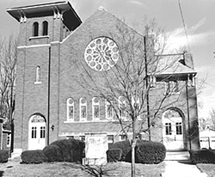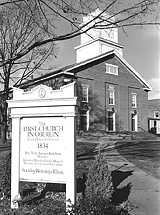

The message on the Chaplain's door in Wilder says, "Always open, to anyone." Local churches and the new Interfaith Group are sharing this motto.
Local churches are becoming more and more open to Oberlin College students. Many people, religious or not, equate church with a strict, conservative setting; however, the churches of Oberlin are welcoming all students with open arms.

Pastor Brian Wilbert of Christ Episcopal Church said that the members of his church come from all walks of life, no matter what race, what income level or their sexual preference. "This is a church that is an inclusive church," he said. "Whether someone is conservative, liberal or moderate, they're all welcome and they're made to feel welcome."
Some of the church's acceptance may be seen as contradictory by agreeing with many concepts, especially homosexuality, that are viewed negatively by most popular religious teachings. At any rate, Wilbert says that there are, in fact, gay members present at his church. "We're gay-friendly, I would say," he said. He also said that there are other churches in Oberlin that are not discriminatory based on sexual preference.
With churches opening up more to students, some students are opening up more to different religions.
Every Thursday at 5:30, the newly-formed Interfaith Group meets to discuss religion at Oberlin. A pluralist group, the meetings consist of a wide variety of people and religious preferences, from Jewish to Ba'hai, Catholic to non-denominational. The group meets not to advertise their individual religions or to argue against one another, but to provide a space for participants to discuss experiences they encounter as a religious person on campus.

The main focus of the group is for persons of different religious beliefs to come together above the lines that separate them. Members seem completely comfortable with the variance, and are able to discuss sentiments on a basis that transcends that fact that group members hold different beliefs. The meeting is student-run, although authority figures such as chaplains are present.
The chaplains themselves are merely branching off onto another positive venture. The Chaplain's office consists of three religious leaders: Rabbi Shimon Brand, Father Edward Kordas and Reverend Fred Lassen.
One notable program they have organized is "Honest Conversations," an open forum for discussions on race, racism and racial issues on campus that occurs each semester. The Office is also sponsoring a Winter Term project where students help rebuild churches burned through hate crimes.
The Chaplain's Office not only provides support and information about services, but also information about places and times of worship. They can inform students of which churches students have favored in the past.
According to Lassen, some of the most popular churches have been Mt. Zion Baptist, First Church and the Unitarian Fellowship. Many of the churches are involved with outreach evnts or programs, such as a spaghetti dinner recently held by the First Church. Whatever a person's religious beliefs, the community work done by some of the churches cannot be ignored. Almost all of the area churches are involved with the Oberlin Community Services Center. Others have their own programs in lieu of or in addition to the programs of the Center. The Christ Episcopal Church, for example, has a Hot Meals program which serves dinner Monday through Friday at 5 p.m.
First Baptist: A neighborhood congregation. (photos by Leslie Torre)
First in our hearts: Located next to Bosworth Hall, First Church of Oberlin is a popular choice for College students.
Copyright © 1998, The Oberlin Review.
Volume 127, Number 12, Decem�r 11, 1998
Contact us with your comments and suggestions.